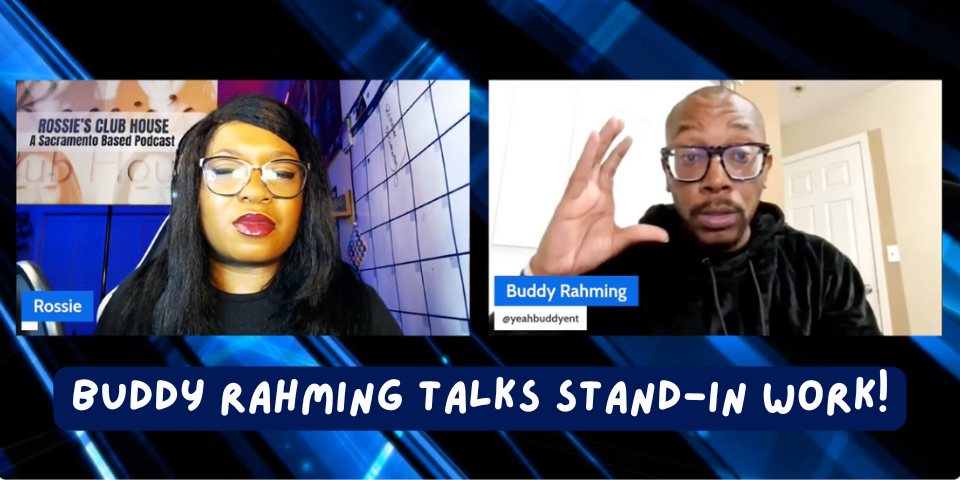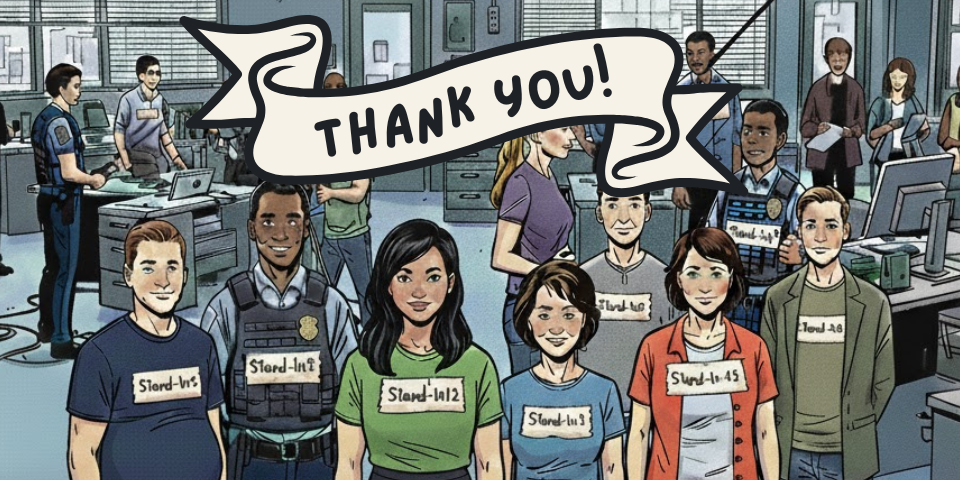Dear Casting Directors,
I work as a stand-in in television and film. From time to time I end up on projects where I am privy to daily callsheets where I can see the advance information for the next day’s shoot. I can use that information for judging how to prepare for the next day’s work.
In particular, I can use that information to evaluate whether I’ll be shooting inside or out, and whether I’ll need warm clothes, rain gear, appropriate footwear for the terrain, and other gear to ensure I am prepared for the work conditions. I can also evaluate whether I’ll be shooting during the day or overnight, and thus I can invest in appropriate sleep in order to prepare for the upcoming shoot. Having this information allows me to be a most helpful, prepared, and professional stand-in.
Most of the time, though, as a stand-in I’m not on projects where I’m privy to the callsheet or any advance information. Or, on those projects in which I am a regular stand-in, sometimes I’m not on for a few days and I end up with no advance information. As a result, I’m in the dark about what I’ll be shooting the next day I’m on set. I rely on you to communicate information to me about the shoot in order for me to be prepared for the workday.
However, often I’m finding I’m not getting appropriate information about the anticipated work conditions, thus I end up on sets underprepared. Other times I’m prepared for a shoot, but I’m finding my fellow members of second team are underprepared for the shoot. I’m writing you to see if you can help me as well as my fellow second-teamers be as prepared as possible for the coming workday.
A Friendly Plea to Casting
I realize that you do not always have intimate information about what is being shot that day, and that sometimes very suddenly schedules change. I also realize that you are often coordinating a number of background actors and their wardrobe details. I would like to make a request in the form of a friendly yet sincere plea to please do your best in giving stand-ins like me basic information about the next day’s shoot so that we may be prepared for it and handle ourselves most professionally.
I request this information because sometimes the information is critical to my job performance. When working on a new project, I may know nothing about its nature. I might choose to dress presuming that we are working on a comfortable sound stage, then arrive to find out we are working outdoors in very uncomfortable conditions. Without the appropriate information, I may find myself in a distressing or even dangerous situation of being underdressed for the weather or environment. If I end up working for eight to fourteen hours, the work conditions may be unbearable if I’m underprepared for them, which could get me injured or sick.
In consideration of my plea, you might counter that I should always dress in layers in anticipation of working outdoors, or that I should bring a large bag of different kinds of gear to endure any number of stand-in work conditions. However, while that recommendation is understandable, it is not completely helpful. Myself, many times I pack as light as possible so that I do not have to stress about any baggage I bring to set, from which I am frequently separated when I’m standing in, and which could be unsecured and out in the open when I’m working. I might have valuables in my bags that could be damaged or wet when I’m not able to monitor them; I might not have brought them had I known I was working outside or going to be separated from them. It is not feasible for me to bring a number of gear options every day to set; it is more feasible to bring options suited to the day’s advance information.
A List of Information Important to Stand-Ins
Here is a list of information you can provide me that would be helpful in my preparing for a day of stand-in work. You might not know all of this information when you call to book me, though you might know more by the time the calltimes are released, in which case I hope you might provide updated information when you give me my calltimes. Some of this information is tremendously better than no information at all, so I hope you can strive to provide at least some of this information when calling to book a stand-in job.
– Are we shooting interiors or exteriors?
This information is perhaps the most basic and most important to the stand-in, information that oftentimes background actors are privy to but not necessarily stand-ins. Information on whether we are shooting interiors, exteriors, or potentially both helps me to prepare for extreme cold or hot temperatures, dress for impending weather, or to dress more normally.
This information helps me in predicting whether I should bring gear in anticipation of particular weather events for the next day, like rain, snow, extreme cold or humidity, etc. If I don’t bring shoes that protect me from cold weather, I may be in extreme discomfort during the day, or if I don’t bring waterproof shoes, I may end up with damaged shoes or wet feet all day. Also, if I don’t wear appropriate sun protection like sunscreen, I may end up burnt, which could be a problem if I’m working on another project that needs my skin tone.
– Will they be making it rain on set?
While the forecast may not be for rain, the production may be manufacturing rain, which can sometimes be soaking. I want to be as dry as I can be when working on a wet set. If you provide me with information that the production is making rain, I can bring the appropriate clothing, gear, and footwear in order to work.
Also, I have an expensive cell phone that I do not want to get damaged by water; if it gets damaged, I may not be able to be in direct contact with you about tomorrow’s work. With your advance information on wet conditions, I can bring extra protection for my cell phone and electronics and work without the stress of their potentially getting damaged.
– Is crew advised to wear bug spray?
I’ve worked on sets where the crew was advised to wear long sleeves and pants because of ticks, yet the message was not passed along to the day-playing stand-ins. That mistake could expose stand-ins to tick and mosquito bites, Lyme disease, West Nile virus, etc., especially if bug spray is not readily available (such as upon arrival on set in the morning). Please pass along any precautions to stand-ins that are also passed along to crew because stand-ins are working as crew.
Day-playing stand-ins do not always feel comfortable asking or seeking out medic provisions like bug spray and sunscreen and sometimes prefer to take care of themselves, especially when such supplies are limited on set or reserved for traditional crew members. Giving stand-ins upfront information can help stand-ins look out for themselves and take precautions ahead of work.
– Will we be working in unusual terrain?
If a scene is to be shot in the woods, in a overgrown area, in mud, in snow, or some other unusual terrain, stand-ins should know. I’ve worked with a stand-in who wore short-shorts to her first day of standing in, having no indication beforehand that her first assignment was to run through thicket deep in the woods. Not only did she end up not only scratched up, but also crew members wondered why she was underdressed for the day’s work. The reason was that casting gave no indication that she needed to dress any differently.
I worked with another stand-in who wore nice open-toed shoes thinking she was working on a sound stage, only to find that she was standing in in mud. While production did get her a different pair of shoes to wear, such provisions are not standard, and sometimes they come too late.
Information on unusual terrain not only tells us how to prepare for work conditions, but it also helps us to ensure that our possessions do not get ruined.
– Will we be working on first unit or second unit?
Different units can shoot in different conditions, and second units often shoot in situations with lesser accommodations. Knowing whether I’ll be shooting with first unit or second unit is helpful because I might prepare myself differently or bring different items with me if I’m anticipating lesser accommodations or different work conditions.
– Will this be an overnight shoot?
If I don’t know that my shoot is predicted to be an overnight shoot when I accept the job, I may jeopardize morning commitments I may have already made (like a stand-in gig the next day). Or I might not be ready to take on the difficulty of staying up all night, especially if my job that day is sitting in or lying in.
I understand that how late a shoot will go is not always clear, but sometimes it is, and it helps immensely in my preparation that I know this in advance. (Fortunately this information is usually provided to me, but not always.)
In Conclusion
As you can tell, this requested information is basic and general, and can be gleaned from preliminary callsheets and advance information that you may be privy to but I might not be.
When you are booking me, I urge you to volunteer this information to me rather than have me ask for it or have me assume I’ll be working on a climate-controlled sound stage.
The information you pass along to me as a stand-in can impact whether I’m prepared for the day or suffering through the day. It takes a few seconds of sharing advance information with me to make a huge difference in my workday preparedness.
Sincerely,
Ben Hauck
Editor, Stand-In Central
and on behalf of many other professional stand-ins
Are you a stand-in who sympathizes with the above? Is there additional information you need in preparing for a day of standing in? Are you a casting director who has a response to the above open letter? If so, please comment below.
Discover more from Stand-In Central
Subscribe to get the latest posts sent to your email.






Yes! Yes! Yes! Thank you for this, Ben!
(from a shivering stand in)